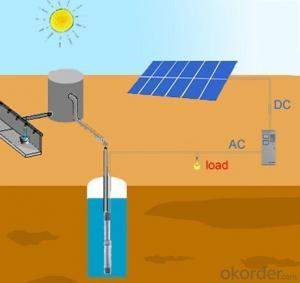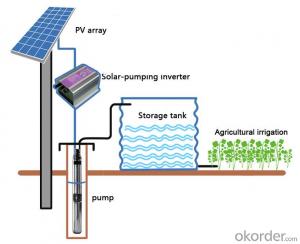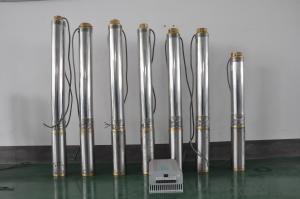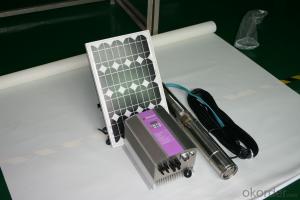Solar Powered Pond Pump Solar Water Pumps
- Loading Port:
- Shanghai
- Payment Terms:
- TT OR LC
- Min Order Qty:
- 1 set
- Supply Capability:
- 1000 set/month
OKorder Service Pledge
OKorder Financial Service
You Might Also Like
Solar Water Pump
DC solar water pumping system consists of the motor, pump, controller, solar array and some other accessories, such as water level sensor, float switch, etc. Considered that storing water is more efficient than storing electricity, the system is designed to directly drive the pump without battery which can reduce the construction and operating cost and routine maintenance effectively.The PV array consists of multiple solar panels connected in series/parallel, which can supply the whole system as power source by converting the absorbed solar radiation energy to the electrical energy. The pump driven by a brushless DC permanent magnet motor draws water from deep-well or river. The pumped water is then fed into reservoir or water tank, or connected to the irrigation system or fountain system directly.
Advanced Technology
Applications Innovation
The efficiency of DC brushless permanent magnet motor has been increased up to 25% in comparison with traditional asynchronous motor.
Technology Innovation
Stator and rotor are sealed by environment friendly casting resin.Motor insulation resistance can be hold higher than 300MΩfor more than 10 years, which consumedly increased the security and reliability of the submersible motor.
Structure Innovation
Casting resign technology processed stator and rotor as well as the water lubricated bearing make the submersible pump environment friendly.
Feature
High Efficiency & High Reliability
DC Brushless Permanent Magnet Motor
Minimum Maintenance, long Service Life
Environment Friendly Materials, Lubricated Without Oil
Application
Village or Family Water Supply
Animal Drinking Water & Livestock Watering
Garden/Courtyard Irrigation
Swimming Pool
Water Supply for Bivouac or Camping Car
Water Supply for Remote Area
Automatic Control
Operate Automatically, No Need Watching
Maximum Power Point Tracking (MPPT)
Dry-run Protection
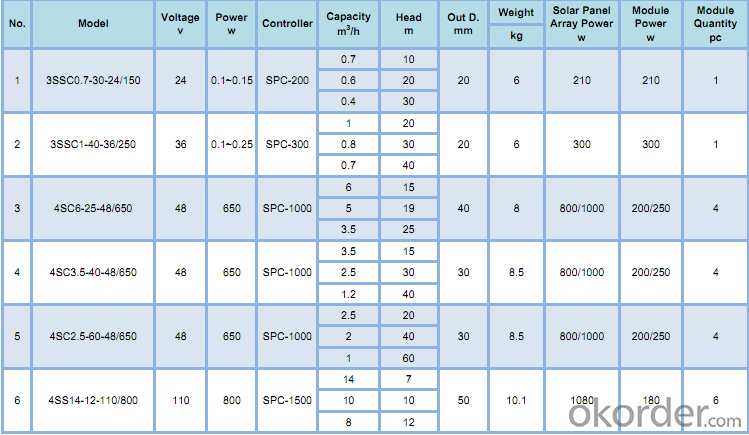
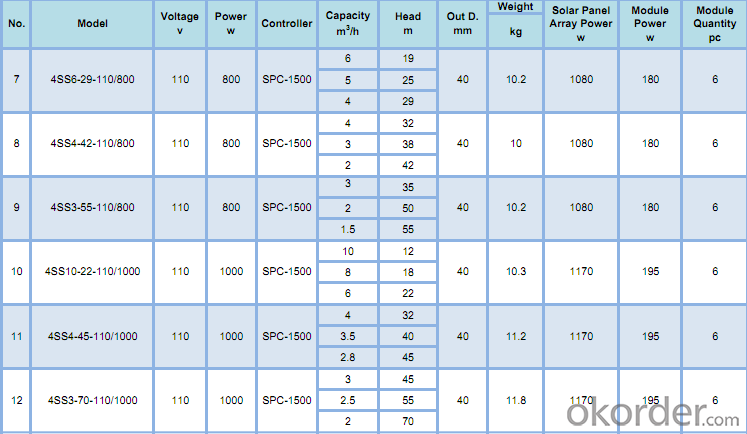
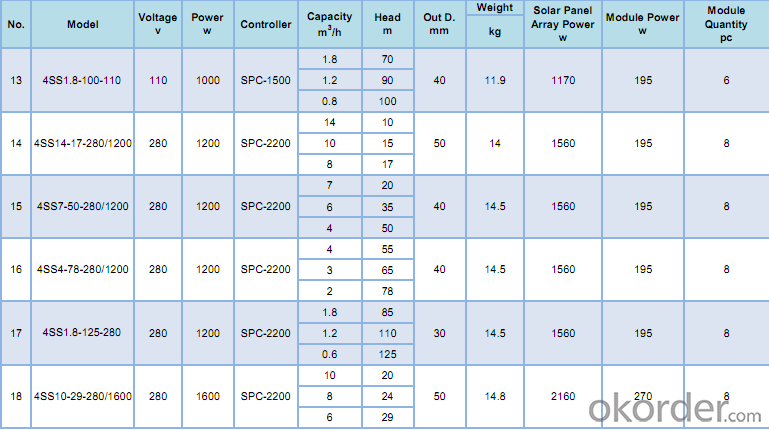
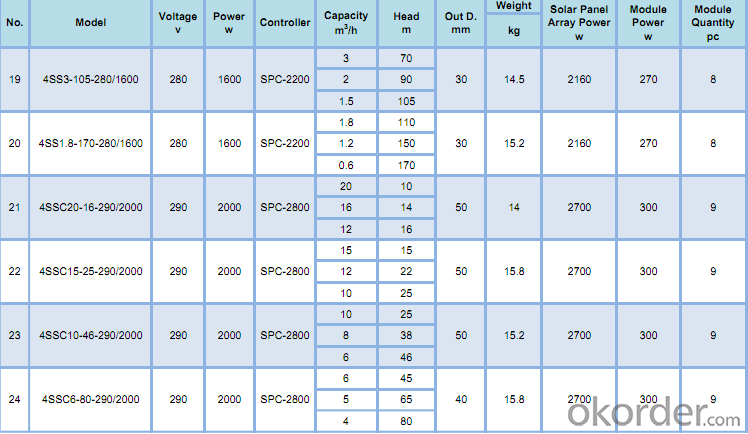
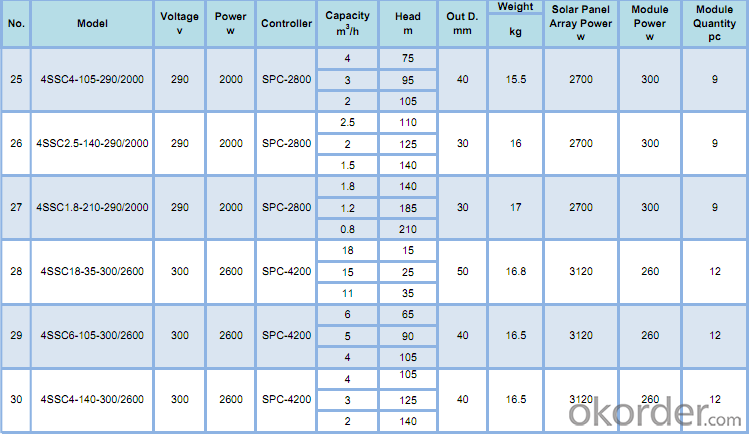
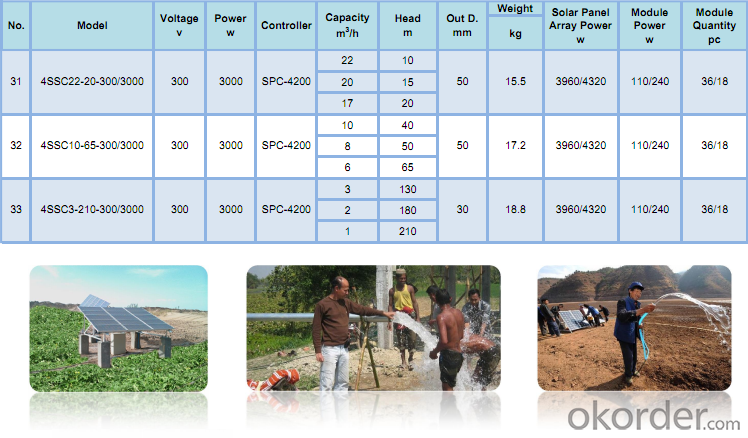
- Q:Are there any restrictions on using a solar pump in agriculture?
- Yes, there can be certain restrictions on using a solar pump in agriculture. Some potential limitations include the availability of sunlight, which can affect the efficiency of the pump, especially in regions with frequent cloudy or rainy weather. Additionally, the initial cost of installing a solar pump can be higher compared to traditional pumps, which may pose financial constraints for some farmers. It is also important to consider the size and capacity of the solar pump, as it may not be suitable for large-scale irrigation needs.
- Q:Can a solar pump be used for wastewater management or treatment?
- Yes, a solar pump can be used for wastewater management or treatment. Solar pumps can be utilized to transfer wastewater from one location to another for treatment or disposal. Additionally, solar-powered systems can be integrated into wastewater treatment plants to power various processes such as aeration, mixing, or filtration, reducing dependency on traditional energy sources and making wastewater management more sustainable.
- Q:Can a solar pump be used in areas with high evaporation rates?
- Yes, a solar pump can be used in areas with high evaporation rates. The solar pump operates by converting sunlight into energy to power the pump, allowing it to draw water from a source and deliver it to the desired destination. While high evaporation rates may cause some water loss, the solar pump can still be effective in providing a consistent water supply, especially if combined with water conservation measures such as proper irrigation techniques or using water storage systems.
- Q:Are there any maintenance requirements for solar pumps?
- Yes, there are maintenance requirements for solar pumps. While solar pumps are generally low maintenance compared to traditional pumps, regular maintenance is still necessary to ensure their optimal performance and longevity. Some of the maintenance requirements for solar pumps include: 1. Cleaning: Regularly clean the solar panels to remove any dust, dirt, or debris that may accumulate on the surface. This will help maximize the solar panels' efficiency and ensure they generate enough power to operate the pump. 2. Inspections: Periodically inspect the pump system, including the motor, pump, and connections, to check for any signs of damage or wear. Look for loose or damaged wires, leaks, or any other issues that may affect the pump's performance. 3. Lubrication: Depending on the type of solar pump, lubrication may be required for the moving parts. Follow the manufacturer's guidelines and recommendations for lubricating the pump to ensure smooth operation. 4. Battery maintenance: If the solar pump includes a battery backup system, regular battery maintenance is essential. This may involve checking the battery levels, cleaning the battery terminals, and replacing batteries if necessary. 5. Professional servicing: It is advisable to have a professional service and inspect the solar pump system at least once a year to ensure everything is in good working order. They can perform more in-depth checks, provide any necessary repairs or replacements, and offer recommendations for optimal performance. By following these maintenance requirements, solar pump owners can ensure their systems operate efficiently and effectively, reducing the risk of breakdowns and extending the lifespan of the pump.
- Q:Can a solar pump be used in areas with low sunlight?
- Yes, a solar pump can still be used in areas with low sunlight. However, its efficiency and performance may be reduced due to the limited sunlight availability.
- Q:Can a solar pump be used in areas with limited space for installation?
- Yes, a solar pump can be used in areas with limited space for installation. Solar pumps come in various sizes and configurations, including compact and space-saving models, making them suitable for installation in areas with limited space. Additionally, solar pumps do not require extensive infrastructure or grid connection, allowing for flexibility in placement and installation even in constrained spaces.
- Q:Can a solar pump be used for water supply in a community center?
- Yes, a solar pump can be used for water supply in a community center. Solar pumps utilize solar energy to power the pumping mechanism, making them a sustainable and cost-effective solution for water supply in areas where electricity is not readily available. They can provide a reliable source of water for various purposes, including drinking, sanitation, and irrigation, making them suitable for community centers.
- Q:Can a solar pump be used in areas prone to earthquakes?
- Yes, a solar pump can be used in areas prone to earthquakes. Solar pumps are generally designed to be durable and resilient, and their operation is not significantly affected by seismic activity. However, it is important to ensure that the solar pump installation is done following appropriate engineering standards and that the system is properly secured to withstand potential ground vibrations during an earthquake. Regular maintenance and inspection should also be conducted to ensure the system's continued functionality and safety.
- Q:Can a solar pump be used in industrial applications?
- Yes, a solar pump can be used in industrial applications. Solar pumps have proven to be a reliable and cost-effective solution for various industrial processes, such as irrigation, water supply, and wastewater management. The use of solar energy eliminates the need for grid electricity, reducing operational costs and environmental impact. Additionally, solar pumps can be easily integrated into existing industrial systems, making them a viable option for industrial applications.
- Q:Can a solar pump be used in saltwater environments?
- Yes, a solar pump can be used in saltwater environments. However, it is important to consider the material and construction of the pump to ensure it is corrosion-resistant and suitable for continuous saltwater exposure.
1. Manufacturer Overview |
|
|---|---|
| Location | |
| Year Established | |
| Annual Output Value | |
| Main Markets | |
| Company Certifications | |
2. Manufacturer Certificates |
|
|---|---|
| a) Certification Name | |
| Range | |
| Reference | |
| Validity Period | |
3. Manufacturer Capability |
|
|---|---|
| a)Trade Capacity | |
| Nearest Port | |
| Export Percentage | |
| No.of Employees in Trade Department | |
| Language Spoken: | |
| b)Factory Information | |
| Factory Size: | |
| No. of Production Lines | |
| Contract Manufacturing | |
| Product Price Range | |
Send your message to us
Solar Powered Pond Pump Solar Water Pumps
- Loading Port:
- Shanghai
- Payment Terms:
- TT OR LC
- Min Order Qty:
- 1 set
- Supply Capability:
- 1000 set/month
OKorder Service Pledge
OKorder Financial Service
Similar products
New products
Hot products
Hot Searches
Related keywords
